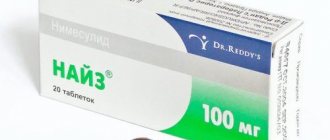Contraindications
- hypersensitivity to dexketoprofen, any other NSAID (NSAID) or to the excipients of the drug;
- if substances of similar action, for example acetylsalicylic acid or other NSAIDs, provoke the development of asthma attacks, bronchospasm, acute rhinitis or cause the development of nasal polyps, urticaria or angioedema;
- if photoallergic and phototoxic reactions were known during treatment with ketoprofen or fibrates;
- history of gastrointestinal bleeding or perforation associated with previous NSAID therapy;
- active phase of peptic ulcer/gastrointestinal bleeding or gastrointestinal bleeding, peptic ulcer, history of perforation;
- chronic dyspepsia;
- other bleeding in the active phase or increased bleeding;
- Crohn's disease or ulcerative colitis;
- severe heart failure;
- moderate to severe renal impairment (creatinine clearance ≤ 59 ml/min);
- severe liver dysfunction (10-15 points on the Child-Pugh scale);
- with hemorrhagic diathesis and other blood clotting disorders;
- for severe dehydration caused by vomiting, diarrhea, or insufficient fluid intake;
- III trimester of pregnancy and lactation.
Dexalgin sachet granules for oral solution, 25 mg per bag, 10 pcs.
The use of Dexalgin® Sachet is contraindicated in the third trimester of pregnancy and during breastfeeding. Pregnancy Suppression of prostaglandin synthesis may adversely affect pregnancy and/or fetal development. According to the results of epidemiological studies, the use of drugs that suppress prostaglandin synthesis in early pregnancy increases the risk of miscarriage, fetal heart disease and nonunion of the anterior abdominal wall. Thus, the absolute risk of developing abnormalities of the cardiovascular system increased from <1% to 1.5%. It is believed that the risk of such events increases with increasing dose and duration of therapy. The use of prostaglandin synthesis inhibitors in animals has caused an increase in pre- and post-implantation losses and an increase in embryofetal mortality. In addition, in animals that were treated with prostaglandin synthesis inhibitors during the period of organogenesis, the incidence of fetal malformations, including abnormalities of the cardiovascular system, increased. However, animal studies of dexketoprofen trometamol have not shown reproductive toxicity. Prescription of dexketoprofen trometamol in the first and second trimesters of pregnancy is possible only in case of emergency. When prescribing dexketoprofen trometamol to women planning pregnancy or in the first and second trimesters of pregnancy, the lowest possible effective dose should be used for the shortest possible treatment period. In the third trimester, all prostaglandin synthesis inhibitors cause risks to the fetus:
- cardiopulmonary toxic syndrome (with blockage of the ductus arteriosus and pulmonary hypertension);
- impaired renal function, which can progress to renal failure with the development of oligohydramnios;
- risks to mother and baby late in pregnancy;
- prolongation of bleeding time (the effect of suppressing platelet aggregation), which is possible even when using low doses;
- delayed uterine contractions with corresponding delayed labor and prolonged labor.
Breastfeeding There is no data on the penetration of dexketoprofen into breast milk. The drug Dexalgin® Inject is contraindicated during breastfeeding. Fertility Like all NSAIDs, dexketoprofen trometamol may reduce female fertility and is therefore not recommended for use in women planning pregnancy. Women who have problems conceiving or are undergoing infertility testing should consider discontinuing the drug.
Mode of application
The recommended dose for adults is 25 mg every 8 hours. The maximum daily dose should not exceed 75 mg. Side effects can be reduced by using the lowest effective dose for the shortest time required to achieve improvement.
Before use, dissolve the entire contents of 1 packet in 1 glass of water and mix well for better dissolution. The resulting solution should be taken immediately after preparation.
The drug Dexa-Zdorovye is intended only for short-term use necessary to eliminate symptoms.
Use along with food slows down absorption, so for acute pain it is recommended to take the drug at least 15 minutes before meals.
Interaction
Other NSAIDs, including selective cyclooxygenase-2 inhibitors and salicylates in high doses (≥3 g/day). With the simultaneous use of several NSAIDs, the risk of ulcers in the digestive tract and gastrointestinal bleeding increases due to their mutual enhancement of action.
Anticoagulants NSAIDs enhance the effect of anticoagulants, such as warfarin, due to the high degree of binding of dexketoprofen to plasma proteins, as well as inhibition of platelet function and damage to the mucous membrane of the stomach and duodenum. If simultaneous use is necessary, it should be under medical supervision and monitoring of appropriate laboratory parameters.
Heparin increases the risk of bleeding (inhibition of platelet function and damage to the mucous membrane of the stomach and duodenum). If simultaneous use is necessary, it should be carried out under medical supervision with monitoring of appropriate laboratory parameters.
Dexalgin
Dexalgin granules for oral solution 25 mg 2.5 g x10, ATX code: M01AE17 (Dexketoprofen) Active substance: dexketoprofen (dexketoprofen) Rec.INN registered by WHO
Dosage form
DEXALGIN®
granules for preparation. solution for oral administration 25 mg: pack. 2.5 g 4, 10, 20 or 30 pcs.reg. No.: LP-004326 dated 06/05/17 - Valid
Release form, packaging and composition Dexketoprofen
Granules for the preparation of a solution for oral administration are irregular in shape, yellow in color, with a lemon smell.
1 pack
dexketoprofen trometamol 36.9 mg,
which corresponds to the content of dexketoprofen 25 mg
Excipients: ammonium glycyrrhizinate - 2 mg, neohesperidin dihydrochalcone - 1.5 mg, quinoline yellow dye (E104) - 1.2 mg, lemon flavor - 40 mg, sucrose with colloidal silicon dioxide (500:1) - 2418 mg.
Clinical-pharmacological group: NSAIDs Pharmaco-therapeutic group: NSAIDs The scientific information provided is general and cannot be used to make a decision about the possibility of using a specific drug.
pharmachologic effect
NSAIDs. It has anti-inflammatory, analgesic and antipyretic effects. The mechanism of action is based on inhibition of prostaglandin synthesis due to suppression of COX.
The analgesic effect occurs 30 minutes after administration, the duration of action is 4-6 hours.
Pharmacokinetics
After taking the drug orally, Cmax of dexketoprofen in humans is achieved on average after 30 minutes (15-60 minutes). Plasma protein binding - 99%. Average Vd is less than 0.25 l/kg. T1/2 is 1.65 hours. Metabolized. It is excreted mainly by the kidneys in the form of metabolites.
Indications for the drug Dexketoprofen
Pain syndrome of mild to moderate intensity in the following diseases and conditions: acute and chronic inflammatory diseases of the musculoskeletal system (rheumatoid arthritis, spondyloarthritis, arthrosis, osteochondrosis), dysmenorrhea, toothache.
ICD-10 codes
Dosage regimen The method of administration and dosage regimen of a particular drug depend on its release form and other factors. The optimal dosage regimen is determined by the doctor. The compliance of the dosage form of a particular drug with the indications for use and dosage regimen should be strictly observed.
Taken orally. The average recommended single dose is 12.5 mg - 1-6 times / day every 4-6 hours as needed or 25 mg 1-3 times / day every 8 hours.
The maximum daily dose is 75 mg. Duration of use - no more than 3-5 days.
For patients with impaired liver or kidney function, the elderly, the initial dose is no more than 50 mg/day.
Side effect
From the digestive system: heartburn, abdominal pain, rarely - erosive and ulcerative lesions of the gastrointestinal tract.
From the nervous system: headaches, dizziness, nervousness, sleep disturbance, paresthesia.
From the cardiovascular system: palpitations, increased blood pressure.
Allergic reactions: skin rash, bronchospasm.
Other: chills, swelling of the extremities, photosensitivity, rarely - changes in the peripheral blood picture, impaired renal function.
Contraindications for use Peptic ulcer of the stomach and duodenum, gastrointestinal bleeding, active bleeding of various origins, increased bleeding, anticoagulant therapy, Crohn's disease, ulcerative colitis, bronchial asthma (including a history), severe heart failure, renal failure, liver failure, pregnancy, lactation, hypersensitivity to dexketoprofen or other NSAIDs.
Use during pregnancy and lactation Use during pregnancy and lactation is contraindicated.
Use for liver dysfunction Contraindicated in liver failure. For patients with impaired liver function, the initial dose is no more than 50 mg/day.
Use for impaired renal function Contraindicated in renal failure. For patients with impaired renal function, the initial dose is no more than 50 mg/day.
Use in elderly patients Caution should be exercised when prescribing the drug to elderly patients. For elderly people, the initial dose is no more than 50 mg/day.
special instructions
Caution should be exercised when prescribing the drug to elderly patients, patients with allergic reactions, systemic connective tissue diseases and patients with hematopoietic disorders.
Patients should be informed that in case of side effects, as well as in the absence of clinical effect within 3-5 days of treatment, it is necessary to inform the attending physician.
Particular caution is required when using dexketoprofen concomitantly with phenytoin, sulfonamides and drugs that reduce blood clotting.
Impact on the ability to drive vehicles and operate machinery
Since dexketoprofen may cause a decrease in the ability to concentrate, it should be used with caution in patients engaged in potentially hazardous activities that require increased attention and speed of psychomotor reactions.
Drug interactions
When using dexketoprofen simultaneously with other NSAIDs, the risk of side effects may increase.
When used simultaneously with lithium preparations, it is possible to increase the concentration of the latter in the blood plasma.
Use dexketoprofen with caution less than 24 hours before the start of use or after the end of methotrexate therapy, since the concentration of the latter in the blood plasma (and, therefore, toxicity) may increase.
Isolated cases of bleeding have been described with the simultaneous use of NSAIDs and anticoagulants.
Note!
Description of the drug Dexalgin sachet granules d/oral. solution 25 mg package No. 10 on this page is a simplified author’s version of the apteka911 website, created on the basis of the instructions for use.
Before purchasing or using the drug, you should consult your doctor and read the manufacturer's original instructions (attached to each package of the drug). Information about the drug is provided for informational purposes only and should not be used as a guide to self-medication. Only a doctor can decide to prescribe the drug, as well as determine the dose and methods of its use.

